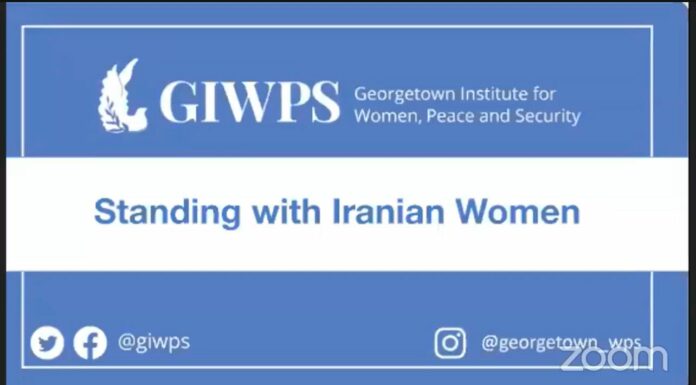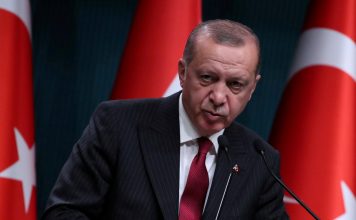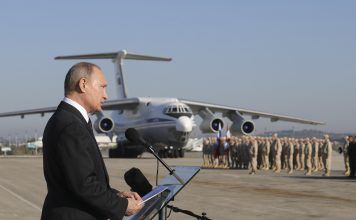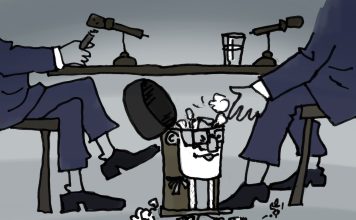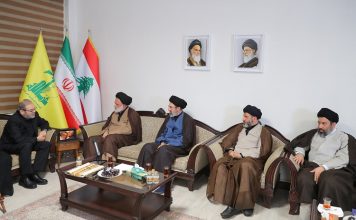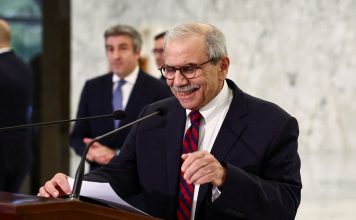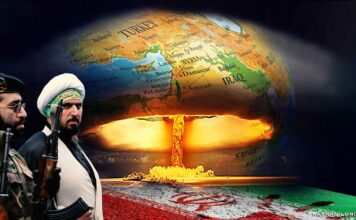Leading Iranian women’s rights advocates discussed the Iran protests and women’s instrumental role in them and women’s participation in it during an online conference held on Nov. 2.

The web-based seminar, titled “Standing with Iranian Women,” was hosted by the Washington-based Georgetown Institute for Women, Peace, and Security (GIWPS) an institute within Georgetown University, and chaired by Ambassador Melanne Verveer, executive director of the GIWPS.
The panelists were Dr. Azar Nafisi, a Georgetown University centennial fellow and author of “Reading Lolita in Tehran”; Masih Alinejad, author and women’s rights campaigner; and Dr. Suzanne Maloney, vice president and director of foreign policy at the Brookings Institution, a Washington-based think tank.
“The protests today have significant implications for the women of Iran and their rights, for the people of Iran, and for greater peace and stability in the region. None of us can afford to look away,” said Ambassador Verveer in her opening remarks.
The seminar focused on the likelihood of regime change in Iran, on gender inequality, and on ways in which the international community could support the demonstrations.
Nationwide protests have broken out in Iran since the Sept. 16 death of 22-year-old Mahsa Amini, who died while in the custody of the country’s morality police.
The protests, which have now gone on for more than 50 days, have turned into a countrywide call for regime change, led by women, men, and children; ethnic and religious minorities; and oil and factory workers. So far, an estimated 277 people — including 40 children — have been killed by the Iranian security forces, according to a Nov. 2 tweet by the Norway-based non-governmental organization Iran Human Rights.
During the webinar, a video message in Persian from the Iran-based political activist Pouran Nazemi was played. Nazemi has since been arrested in Iran; the charges remain unclear, and no further details about her detention have been released by Iranian officials.
Nazemi said in her video message that there were reports of female police officers or members of special security units attacking girls on the streets. She said she was concerned that some women had become part of “the violent and oppressive arm of the state.” Nazemi addressed those women and asked that they reconsider their actions.
Nazemi said children from the ages of seven to 20-years-old were living “under the most terrible conditions,” and that children taking part in the protests had reportedly been given long prison sentences on trumped-up charges. Nazemi ended by thanking all those who supported the protests.
Dr. Nafisi then spoke of the Iranian regime’s strategy for controlling Iran’s population, and an apparent confusion in the West about what freedom meant to Iranians.
“One of the first things a totalitarian regime does is steal your identity. It confiscates your history and rewrites it, and the Islamic Republic has done this so well,” Nafisi said.
“If you want to go [into the history of Iran], a certain [Western] outlook says that freedom is essentially Western: that if you want freedom of choice, freedom of association, you’re in fact being Western,” Nafisi added. “But over [the course of] the 20th century, Iranian women gained rights which women in the West didn’t even have.”
Nafisi said she celebrated the women of Iran and was “outraged and angered by the violence and brutality of the regime.” At the same time, she said, she remained “hopeful and elated by the heroic struggle of the Iranian women and the Iranian people.”
Alinejad said the protests were “about millions of Iranian women trying to send a clear message to the rest of the world: that when we are fighting against the compulsory hijab, we are fighting against one of the most important pillars of the religious dictatorship.”
Alinejad added that people in Iran were sending her videos of the protests despite the threat of prosecution for sharing such content. “They are doing this because they want the rest of the world to recognize this revolution. I know this is not going to happen overnight. This is a marathon. We have a really tough way ahead. But this is the beginning of the end [of the Iranian regime].”
Alinejad voiced the hope that Western leaders would do more to support the protests, and called for international solidarity with the women of Iran.
Dr. Maloney offered analysis on the current wave of Iran protests, and said an estimated 40 percent of Iranians detained were under the age of 20.
“What we’re seeing today is truly unprecedented. It t is historic,” Maloney said. She also described current events as “the beginning of the end of the Islamic Republic. The difficult part is that the trajectory remains very uncertain.”
Maloney suggested that the conventional thinking by the US about Iran, and assumptions that the Islamic Republic was evolving and reforming, were outdated, and the US needed to adjust its approach.
“Iran today is the only country in the world that is providing combat support, direct material assistance to the Russian war effort in Ukraine. This is not a government [with which] we’re going to be able to achieve a stable rapprochement,” Maloney said.
“We have to adjust our approach and recognize that the human rights situation is a high priority, that we have to be mobilizing all the instruments of national power to try to advance what is already happening on the streets of Iran, a process of change under way from the Iranian people,” she added.
Ambassador Verveer asked the panelists what they thought the way forward might be for the people of Iran, and what support could be offered by the international community.
Nafisi said a show of unity around the world was needed, and urged democratic countries to recall their ambassadors from Iran.
ANALYSIS: Women-Led Protests Are Shifting the West’s Attitude Towards Iran
Alinejad urged Western countries to call for Iran to be removed from the United Nations Commission on the Status of Women.
Maloney said Washington was trying to enable internet access for Iranians in the country amid government-sanctioned internet blackouts. She suggested that individuals donate money to verified causes helping Iranians, and said the the US government was likely to keep its engagement with the protests to help raise awareness.


